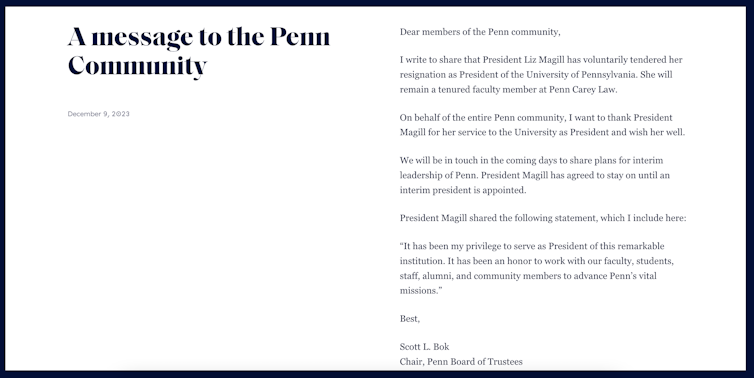
By Lynn Greenky
If a student were to walk off the Harvard campus and onto a street in the city of Cambridge, Massachusetts, and argue for the genocide of Jews, the U.S. Constitution would bar prosecuting her for hate speech.
If the same student left her perch on the sidewalk and returned to the Harvard campus to continue the rant, the student could be silenced by campus police and either suspended or expelled from the university under the school’s code of conduct.
The same is true for many other campuses across the nation, including the University of Pennsylvania and MIT. Private colleges and universities have speech codes that allow them to punish certain speech. But in their Dec. 6, 2023, testimony before Congress about antisemitism on their campuses, Presidents Elizabeth Magill of UPenn, Sally Kornbluth of MIT and Claudine Gay of Harvard failed to clearly state that, when pressed by U. S. Rep. Elise Stefanik to explain what would happen if someone on campus called for the genocide of Jews. Magill just resigned, in large part over the furor that followed.
I taught undergraduates argumentation and First Amendment law for 15 years at Syracuse University and have written a user’s guide on the First Amendment: When Freedom Speaks.

AP Photo/Yuki Iwamura, File
I am surprised by the presidents’ failure to respond clearly to Stefanik’s question. The primary purpose of schools is to educate. Private colleges and universities are governed by codes of conduct that support and carry out that objective.
Although private colleges and universities can and often do attempt to recreate the broad boundaries of protected speech provided by the First Amendment, those boundaries can legally be narrowed by their educational mission. They do this because hatred can poison a healthy learning environment and impair the ability of targeted students to participate fully.
Public colleges generally must apply broader constitutional standards regarding speech on campus. But campus codes at private colleges and universities seek to resolve the conflict between the right to speak freely and the educational mission of the institution. The ham-handed and over-legalistic responses by the three university presidents show how this attempt to balance speech and safety can create confusion, conflict and the opportunity for selective enforcement decisions based on academic fashion, not values of free and open debate.
Private restrictions; public free speech
Words matter. As long as the words don’t include a realistic threat that sticks, stones and worse will soon follow, the First Amendment protects them from repression by the government.
Constitutionally speaking, ideas – whether they be mainstream or scorned – that do not incite violence or intentionally terrorize the target are permissible speech. The First Amendment requires such ideas be available to the public to examine and criticize. Hyperbolic hate speech, even speech that endorses genocide or calls for forced racial and ethnic division, cannot be criminally prosecuted by states or the federal government. Those words might offend and frighten, but they are often part and parcel of emotionally charged political speech.
Harvard provides an example of how campus conduct codes restrict speech that would normally be allowed under the First Amendment. The student handbook states that the free exchange of ideas must proceed within the “bounds of reasoned dissent.” The First Amendment does not demand any such limitation on speech, and state and federal governments are constitutionally prohibited from establishing or enforcing any such commitments.
The code of conduct at the University of Pennsylvania requires the members of its community to “respect the health and safety of others.” Under the First Amendment, though, state and federal governments are constitutionally prohibited from requiring such limits.
MIT prohibits harassment, defined as “public and personal tirades.” The First Amendment provides no such moral guidelines. It does not distinguish between truth or lies, myth or reality, virtue or villainy. It only creates a space to speak where the government has limited power to interfere.

UPenn website
Selective enforcement?
Yet despite universities’ codes of conduct, there is a growing perception – supported by the highly technical and qualified answers given at the hearing by the college presidents – that they and other colleges and universities are selective in their application of conduct codes and use them to promote a political agenda.
In situations involving race and gender, schools have been quick to warn against, rein in or punish speech that administrators find offensive. In 2017, Harvard rescinded admission offers to 10 students who posted sexually explicit memes, some targeting minority groups. Stefanik, in a Wall Street Journal op-ed, wrote that in 2022, as part of mandatory anti-bias training, Harvard warned its undergraduate students that cisheterosexism, fatphobia and using the wrong pronouns was abusive.
In 2016, several colleges issued proposed guidelines regarding offensive Halloween costumes. In 2013, two students at Lewis & Clark College were charged with discrimination or harassment for hosting a private, racially themed party. In 2006, the University of Wisconsin-La Crosse attempted to limit printing of a satirical article deemed by the administration to threaten the recruitment and retention of students from underrepresented groups, although that decision was later reversed.
In contrast, Jewish students at the three universities whose presidents testified in Congress accuse their schools of failing to provide a clear response to alleged repeated harassment of Jewish students and staff members.
Advocates for campus free speech
But rather than punishing certain speech, others call for colleges and universities to hold fast to the principle underlying First Amendment freedoms: More speech, not less, leads to a healthy democracy.
Proponents of robust speech protections on campus argue that codes that confine speech to polite dialogue stifle the ability to learn about different perspectives and truths, which sometimes only find expression in heated diatribes. Instead, they propose that, in addition to clear condemnation, educational institutions should respond to hateful speech with countermessaging and dialogue as well as support for targeted individuals and groups.
Many of today’s students have little understanding or respect for a campus – and by inference, a democracy – where all ideas are subject to scrutiny, particularly those that are loathsome to them. To me, the data is alarming:
- 46% of students support shout-downs of speakers with whom they disagree.
- 51% of students believe some topics should be banned from being debated on campus.
- 45% of students believe that physical violence is justified in response to hate speech.
PEN America, a 100-year-old organization dedicated to celebrating and protecting creative expression, urges colleges and universities to use caution when attempting to balance speech with safety.
Others warn that codes of conduct offer a false sense of safety to targeted students. Their point: Unless such codes are carefully crafted and applied only to speech that creates physical harm or terror, they will succeed mainly in driving hatred underground into echo chambers, where it tends to become more extreme and more dangerous.
![]()
Lynn Greenky is Professor Emeritus of Communication and Rhetorical Studies at Syracuse University.





























Marc Crane says
There’s horrible hate speech on college campuses brought by the left often of the guise of protests. It’s time to end this. Resign Gay! Let your institution move forward without your hate.
Samuel L. Bronkowitz says
Remember that time that UF brought in richard spencer to speak? That seems like free speech legacy more along your lines.